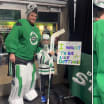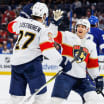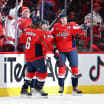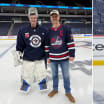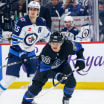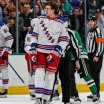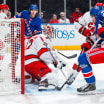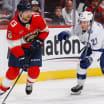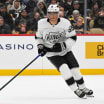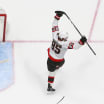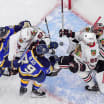If ever a team had the odds stacked against it heading into the
Stanley Cup Final
, it was the 1950 New York Rangers facing the mighty Detroit Red Wings.
Although the Rangers had upset the Montreal Canadiens in five games to win their semifinal series, coach Lynn Patrick's club was considered the underdog-of-all-underdogs against the Red Wings in the Final. The Rangers had finished under .500 (28-31-11), fourth in the six-team League. The first-place Red Wings ended the season with 88 points, 21 more than New York.
Rangers nearly defied odds in 1950 Final against Red Wings
Got to double overtime in Game 7 despite playing entire series away from home
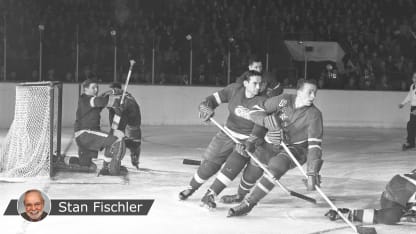
© Getty Images
By
Stan Fischler
Special to NHL.com
"Even worse from our viewpoint," general manager Frank Boucher said, "we were being deprived of a single playoff game in the Finals on home ice."
For the first time in a seven-game Cup Final, one team had to play every game on the road. The Ringling Brothers and Barnum & Bailey Circus had top priority at Madison Square Garden, and the elephants were not moving out until May. That meant no games in their own building for the Rangers.
RELATED: [Detroit Red Wings win 1950 Stanley Cup]
NHL President Clarence Campbell allowed the Rangers to play two "home" games at Maple Leaf Gardens in Toronto, about 350 miles from the Garden. The other games, as many as five, would be in Detroit. It was a take-it-or-leave-it deal, and Boucher took it.
Thanks to the heroics of
Hart Trophy
-winning goalie Chuck Rayner and center Don Raleigh, who scored overtime goals in Games 4 and 5 -- as well as Patrick's brilliant coaching -- the Rangers actually led the series 3-2 entering Game 6.
"It looked like they had us," Red Wings captain
Sid Abel
said.
It certainly looked that way after the Rangers took 2-0 and 3-1 leads in Game 6 at Olympia Stadium, only to have the Red Wings tie the game 3-3. Tony Leswick put the Rangers in front 4-3 when he scored 1:54 into the third period, but Ted Lindsay tied it 4-4 by beating Rayner at 4:13.
It was then that Abel saved his squad from an unexpected exit. In "The Game I'll Never Forget," compiled by Chris McDonnell, Abel analyzed his winning goal.
"I got the puck in front of Rayner," he remembered, "and got off a wrist shot. Somehow he stopped it and I was knocked to my knees the same moment that the puck hit him.
"But the rebound came back to me, and I was able to get my stick on it and shoot the puck past him."
The Red Wings hung on for a 5-4 win, pushing the series to Game 7 the next night, April 23, 1950, also at Olympia Stadium.
"That loss in Game 6 should have been the crusher," Boucher said, "but Lynn did a wonderful job of restoring our spirit."
Whatever Patrick did, his team was ready to go. The Rangers came out for Game 7 looking anything like a team that had been crushed by a disheartening loss.
"We matched them as well as any team could," Rangers defenseman Pat Egan said at his New Jersey home long after he had retired. "We even had them on the ropes."
While the Olympia crowd watched in stunned silence, the Rangers took a 2-0 lead in the first period on goals by Allan Stanley and Leswick. After Detroit tied the game 2-2, the Rangers went ahead again on Buddy O'Connor's goal midway through the second period. Undaunted, the Red Wings tied the game 3-3 late in the period when Jimmy McFadden's angled shot beat Rayner.
Rayner and his Detroit counterpart, Harry Lumley, were flawless in the third period. The result was the third overtime game in the series and the first Game 7 in the Final ever to go past three periods.
Now the tables had turned and the Red Wings took command. Throughout the first overtime period, it appeared that Detroit would win. "We had by far the better chances," Abel said. "We were carrying the puck to the Rangers but either couldn't get the puck past Rayner or couldn't put it on net."
Though Detroit dominated play, the first overtime ended 3-3.
In his autobiography, "When The Rangers Were Young," Boucher wrote that his team was "desperately tired" at the start of the second extra period, yet almost had the winner with a breakaway thrust.
"We almost got the goal that would have spelled victory," Boucher wrote. "Raleigh broke in alone on Lumley and appeared to have him beaten, but the puck clanged off the goal post."
Or as Rangers radio play-by-play man Bert Lee shouted, "It missed by inches only!"
For eight more minutes the teams exchanged rushes until a face-off took place deep in the Rangers zone. Patrick seemed undecided about his next move since he had two crack centers, Buddy O'Connor and Edgar Laprade, to take the draw. After initially seeming to opt for Laprade, Patrick suddenly changed his mind and sent O'Connor into the circle.
It was then that Detroit's face-off man, George Gee, made a strategic move that would decide the game. He ordered left wing Pete Babando, who earlier in the series had been benched for poor play, to line up directly behind him.
Sure enough, Gee won the draw and, precisely as planned, skimmed the puck directly to Babando, who took a backhander. "When Pete shot," Abel recalled, "their defenseman, Allan Stanley, was inadvertently screening Rayner.
"At the last split-second, Rayner kicked out his left pad -- got a piece of the rubber -- but the puck went over the pad and into the far corner of the net."
While the Olympia crowd roared its approval, the teams shook hands and headed to their respective dressing rooms. The Red Wings marveled at the resiliency of the Rangers throughout the seven-game series and let them know it.
Abel, especially, was filled with such admiration for his opponents that he walked into the Rangers dressing room and delivered six deathless words: "Don't you guys know when to quit?"
Defeated but unbowed, Boucher offered the perfect squelch: "Wait 'til next year!"
